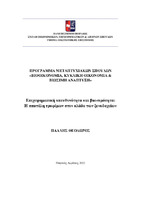Επιχειρηματική υπευθυνότητα και βιωσιμότητα : η σπατάλη τροφίμων στον κλάδο των ξενοδοχείων
Corporate responsibility and sustainability : food waste in the hotel industry

View/
Keywords
Επιχειρηματική υπευθυνότητα ; Διαφάνεια ; Στόχοι Βιώσιμης Ανάπτυξης ; Σπατάλη / απώλεια τροφίμων ; Περιβάλλον ; ΞενοδοχείαAbstract
With the climate crisis affecting our lives in more and more areas, practices of adopting
sustainable behaviours and innovative initiatives are on the rise. Recent actions and
reform policies are paving the way for businesses, governmental bodies and society to
be able to contribute actively to the development of strategies and the acquisition of
responsible consciences and mindsets towards a sustainable transition with life and
people at its centre.
This thesis, based on the recent literature and the trends in the integration of sustainable
strategies by companies including those in the hospitality industry, aims to highlight
the importance of the term sustainability by managers and organizations. At the same
time, it aims to raise awareness about the food loss and waste (FLW) phenomenon,
given the limited knowledge among citizens and workers due to the lack of basic
awareness and education on the issue at all stages of the supply chain, a waste that is
found at very high levels mainly in home and restaurant kitchens and specifically at the
consumption and preparation stage. Focusing on the issue of food management in the
hotel sector, terms related to sustainable innovation, environmental balance and social
well-being will be analysed, with the aim of highlighting problems and ways to address
them.
Given the predictions of a growing global population in the coming years and the
environmental burden of imprudently food waste, a situation that leads to
environmental degradation and climate variations, the approach to the phenomenon by
both private businesses and governmental bodies so far reveals many gaps in policies,
decision-making and response measures. With the international directives issued in
recent years in the context of the United Nations Sustainable Development Goals,
which aim, among other things, to develop sustainable business strategies, to create
healthy partnerships that respect people and the environment, to combat phenomena
such as extreme hunger and to promote responsible consumption and production, the
strategic orientation of those in charge and the intention to improve the current situation
are clearly demonstrated, emphasizing the means needed and on which efforts to
achieve change are based.
With the term of business sustainability being at the core of the thesis, it will also analyse how
businesses in the context of the green transition will be able to adapt and incorporate
sustainable practices without putting their profitability at risk, emphasizing on terms
such as the Triple Bottom Line (3P's) and the development of ESG criteria. Given that
the banking system is now obliged to examine these criteria to finance a business, while
providing significant and measurable privileges to those who transparently adopt them,
charting a course for a sustainable transition, for all businesses regardless of size,
becomes necessary. Moreover, it will be examined how the issue of food waste is a
problem both at the consumer and business level, especially in the hospitality sector,
where technology and innovative tools, which aim to measure the quantities produced
and reuse them in the context of the circular economy, tend to become an integral part
of corporate governance and, by extension, to limit the phenomenon, lay the
foundations for transforming the problem into sustainable innovation, while creating
added value for themselves, the environment and the wider society in which they
operate.


